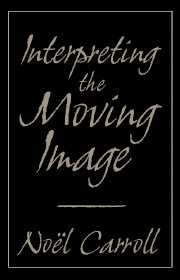Book contents
- Frontmatter
- Contents
- Foreword: Through Carroll's Looking Glass of Criticism
- Introduction
- 1 The Cabinet of Dr. Kracauer
- 2 Entr'acte, Paris and Dada
- 3 The Gold Rush
- 4 Keaton: Film Acting as Action
- 5 Buster Keaton, The General, and Visible Intelligibility
- 6 For God and Country
- 7 Lang, Pabst, and Sound
- 8 Notes on Dreyer's Vampyr
- 9 King Kong: Ape and Essence
- 10 Becky Sharp Takes Over
- 11 Interpreting Citizen Kane
- 12 The Moral Ecology of Melodrama: The Family Plot and Magnificent Obsession
- 13 Mind, Medium, and Metaphor in Harry Smith's Heaven and Earth Magic
- 14 Welles and Kafka
- 15 Nothing But a Man and The Cool World
- 16 Identity and Difference: From Ritual Symbolism to Condensation in Anger's Inauguration of the Pleasure Dome
- 17 Text of Light
- 18 Joan Jonas: Making the Image Visible
- 19 Introduction to Journeys from Berlin/1971
- 20 The Future of Allusion: Hollywood in the Seventies (and Beyond)
- 21 Back to Basics
- 22 Amy Taubin's Bag
- 23 Herzog, Presence, and Paradox
- 24 Film in the Age of Postmodernism
- Notes
- Index
24 - Film in the Age of Postmodernism
Published online by Cambridge University Press: 05 June 2012
- Frontmatter
- Contents
- Foreword: Through Carroll's Looking Glass of Criticism
- Introduction
- 1 The Cabinet of Dr. Kracauer
- 2 Entr'acte, Paris and Dada
- 3 The Gold Rush
- 4 Keaton: Film Acting as Action
- 5 Buster Keaton, The General, and Visible Intelligibility
- 6 For God and Country
- 7 Lang, Pabst, and Sound
- 8 Notes on Dreyer's Vampyr
- 9 King Kong: Ape and Essence
- 10 Becky Sharp Takes Over
- 11 Interpreting Citizen Kane
- 12 The Moral Ecology of Melodrama: The Family Plot and Magnificent Obsession
- 13 Mind, Medium, and Metaphor in Harry Smith's Heaven and Earth Magic
- 14 Welles and Kafka
- 15 Nothing But a Man and The Cool World
- 16 Identity and Difference: From Ritual Symbolism to Condensation in Anger's Inauguration of the Pleasure Dome
- 17 Text of Light
- 18 Joan Jonas: Making the Image Visible
- 19 Introduction to Journeys from Berlin/1971
- 20 The Future of Allusion: Hollywood in the Seventies (and Beyond)
- 21 Back to Basics
- 22 Amy Taubin's Bag
- 23 Herzog, Presence, and Paradox
- 24 Film in the Age of Postmodernism
- Notes
- Index
Summary
The recent history of the avant-garde film in America mirrors the general pattern of cultural experience over the last two decades. The sense of a unified oppositional movement concerned with the war in Vietnam, student protest, and opposition to racial and sexual domination gives way to a sense of the collapse of that unified energy into a range of heterogeneous projects. If in 1971, one could feel part of the cutting edge of history, that feeling is no longer available. Where in the early seventies the future seemed promising, few today have much confidence about where we are headed.
Avant-garde film of the early seventies appeared to propose, at least to many of its most vocal adherents, a privileged relation to history. It witnessed the ascendency of structural film, which asserted a decisive break not only with commercial entertainment film, but also with the previously dominant tradition of the avant-garde, which was highly expressionist in its practices and theory. At the same time structural film proposed a revolutionary break with several cinematic pasts, it also seemed to afford filmmakers with something like a paradigm for working out a project that could be expatiated endlessly into the future. In the early seventies, there was momentary euphoric agreement about the task of film and about the shape that the future of film should take. A language of criticism, quasi-theory, and appreciation took hold that invited everyone to board the train of film history and to ride into a bountiful future.
- Type
- Chapter
- Information
- Interpreting the Moving Image , pp. 300 - 332Publisher: Cambridge University PressPrint publication year: 1998



